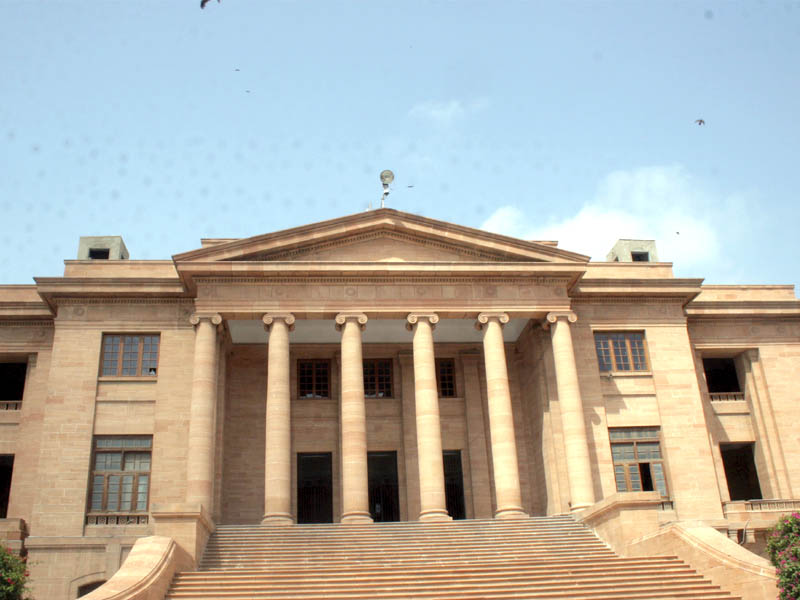
The top provincial government law officer, Barrister Zamir Ghumro, disclosed this before a three-judge larger bench during the hearing of a set of petitions challenging the National Accountability Ordinance 1999 Sindh Repeal Act, 2017.
The opposition parties - the Muttahida Qaumi Movement - Pakistan, Pakistan Muslim League - Functional, Pakistan Tehreek-e-Insaf and social rights group Pasban-e-Pakistan - had challenged the law enacted by the Pakistan Peoples Party (PPP)-led government that had repealed the accountability ordinance in Sindh and also provided for transferring graft-related cases to the provincial anti-corruption authority.
Barrister Ghumro informed the bench that it had been decided to place the Act before the Sindh Cabinet to reconsider and examine the recently enacted law. He expressed the hope that the cabinet will soon meet to reconsider and examine the law.
Sindh governor shoots down NAB ordinance repeal bill
Therefore, AG Ghumro pleaded to the three-member larger bench to adjourn proceedings until the outcome of the cabinet's meeting. Granting the request, the larger bench adjourned the hearing on the petitions for four weeks. However, it allowed the provincial chief secretary and advocate-general to take action strictly in accordance with the law.
The judges also directed them to submit a report on the decision of the cabinet meeting.
Last month, a two-judge bench allowed the national anti-graft watchdog to continue with pending inquiries till further orders and ordered the accountability courts in the province to also proceed with corruption-related references pending with them.
Furthermore, the court had sought from NAB details of the sitting and former lawmakers as well as serving and retired government functionaries against whom inquiries or investigations were pending with the bureau.
In their petition, the opposition parties' had alleged that the PPP was engaged in rampant corruption in the province and the NAB ordinance was the only stumbling block against corruption. Opposition leaders argued that the leadership of the PPP and bureaucrats serving under them were facing a number of investigations under the NAB ordinance, while there was a possibility of many more such cases being filed in the future due to the magnitude of corruption in Sindh.
Larger bench constituted to hear NAB ordinance repeal petitions
The opposition parties alleged that in order to stall the working of the NAB authorities under the NAB ordinance, the PPP legislators in Sindh bypassed all the prescribed procedures and introduced the National Accountability Ordinance 1999 Repeal Bill, 2017 in the Sindh Assembly on July 3 and passed it without permitting any discussion or debate.
They told the court that the governor had returned the bill to the assembly with a message to reconsider it but the unconstitutional bill was re-laid without any amendment and a summary was sent to the governor to reconsider signing the bill.
The opposition leaders argued that more than 10 days had lapsed since the bill was unlawfully passed, despite the governor returning it to the assembly for reconsideration. Thus, according to Article 116 of the Constitution, after the lapse of 10 days since the date it was re-passed by the assembly, the bill now has been translated into an act of the Sindh Assembly. The government had also notified the same, therefore, the petitioners were left with no other remedy but to file the petition.
Their lawyer, Barrister Farogh Naseem had argued that the National Accountability Ordinance 1999 Repeal Bill, 2017 was completely unconstitutional, malafide, void ab-initio and was liable to be annulled.
National Accountability Ordinance repealed by Sindh Assembly
He had argued that the entire bill is premised on the supposition that after the abolishment of the legislative concurrent list in the 18th Amendment, matters of criminal law, procedure and evidence now solely fall within the ambit of the provincial assembly. "This stance is altogether completely fallacious," he said, adding the federal and provincial legislatures will continue to have concurrent reach in criminal matters.
"The Act is in total violation of articles 142(b) and 143 of the Constitution," Barrister Naseem argued and pointed out the bare reading of Section 43 of the bill will reveal that the same had repealed the Sindh Enquiries and Anti-Corruption Act, 1991 and rules made there-under, as Section 38 of the Act provides that such statute will have an overriding effect notwithstanding anything contained in any other law in force for the time being.
Barrister Naseem alleged that the Act was an attempt by the Sindh legislature to save the PPP's leadership and the bureaucrats serving under them from being exposed to inquiries, investigations, proceedings and cases under the NAB ordinance, which militates against the right of the petitioners and people of Sindh.
The SHC was pleaded to annul the act, declaring it unconstitutional. The petitioners also requested the court to declare that the enacted law does not override or eclipse the inquiries launched or filed under the NAB ordinance.
The court was also requested to permanently, or during pendency of the petition, restrain the respondents from transferring any inquiry, investigation, proceedings or cases under the NAB ordinance to any other authority under the new law.

















COMMENTS
Comments are moderated and generally will be posted if they are on-topic and not abusive.
For more information, please see our Comments FAQ